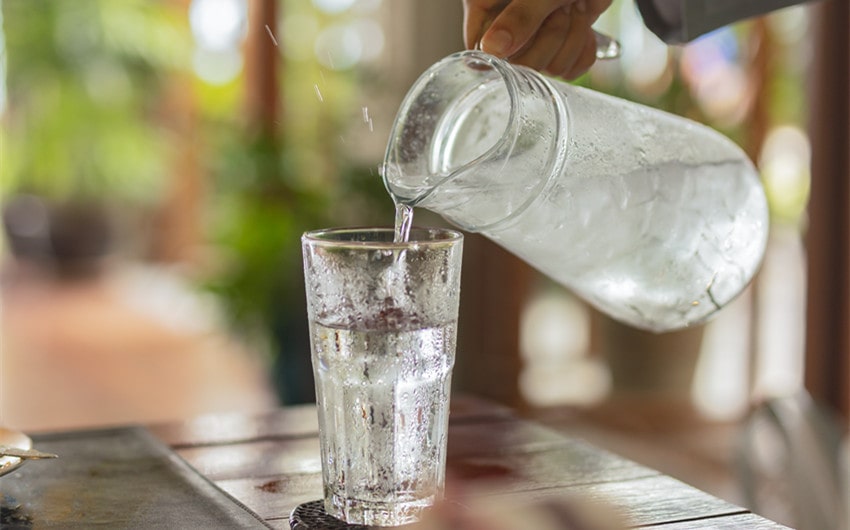Have you ever wondered if reaching for that glass of ice-cold water could be doing more harm than good? This article delves into why “is drinking cold water bad for you” is a question worth considering.
Understanding the Appeal of Ice Water

The allure of ice water is as clear as the liquid itself. On hot summer days, or following intense physical exertion, nothing seems to quench thirst quite like a glass filled with ice cubes. The immediate drop in body temperature it offers is not just a relief but a visceral pleasure, making it a go-to choice for refreshment worldwide. Beyond mere hydration, ice water has become synonymous with vitality and rejuvenation, a quick fix to revive spirits and energy levels.
However, this ingrained preference for ice-cold water over its warmer counterparts isn’t solely about physical relief. Culturally, chilled beverages have come to symbolize leisure and luxury, a small daily escape akin to a refreshing dip in a cool pool. Marketing messages reinforce this view, with advertisements frequently depicting ice water as the ultimate way to cool down and kick back.
Yet, beneath this glossy surface of immediate gratification and cultural allure lies a complex interplay of physiological responses. The body’s reaction to cold water, especially when it contrasts sharply with internal temperatures, sparks a series of adjustments.
These responses, while seemingly benign or even beneficial at first glance, invite a closer examination of what happens inside us when we opt for that ice-cold drink. Understanding these impacts requires delving deeper into the physiological and potentially adverse effects of this common habit, moving beyond the initial appeal to explore what truly serves our health and well-being.
The Hazards of Drinking Ice Water

The refreshing sensation of ice water, often sought after for immediate relief from heat or thirst, masks several potential hazards that can affect our health in subtle yet significant ways. The consumption of ice-cold beverages, particularly in excess or as a regular habit, may pose risks to various aspects of our bodily functions, from digestion to cardiovascular health. Here’s a closer look at the concerns associated with drinking ice water:
1. Digestive System Disruption
One of the primary concerns with consuming ice water is its impact on the digestive system. Traditional beliefs and some modern health perspectives suggest that the cold temperature of the water can significantly slow down the process of digestion. When cold water enters the stomach, it can solidify fats from foods, making them more difficult for the body to break down.
Furthermore, the cold can cause a contraction of blood vessels around the stomach and intestines, potentially leading to decreased blood flow and reduced digestive enzyme effectiveness. This slowdown not only affects how efficiently food is digested but may also lead to discomfort, bloating, and other digestive issues.
2. Throat Irritation and Mucus Production
Drinking cold water regularly, especially in large quantities, can lead to throat irritation. The sudden chill can be a shock to the mucous membranes, leading to a mild inflammatory response. This can cause a feeling of soreness in the throat and can be particularly problematic for individuals with pre-existing conditions like sore throats or chronic tonsillitis.
Additionally, there is a belief that cold water increases mucus production, which, while helping to warm the ingested fluids, can exacerbate symptoms in people with respiratory conditions such as asthma or chronic bronchitis.
3. Cardiovascular Stress
The impact of ice water on the cardiovascular system is another area of concern. The body’s natural response to cold is to constrict blood vessels, a process known as vasoconstriction.
This reaction, while helpful in reducing heat loss, can increase blood pressure temporarily as the heart must work harder to pump blood through the narrowed vessels. For individuals with underlying heart conditions, this added strain can pose significant risks, highlighting the need for caution with cold water consumption.
4. Slowed Metabolic Function
There’s also a theory that suggests drinking cold water could slow down the body’s metabolic rate. The logic behind this is that the body must expend additional energy to warm the cold water to body temperature, which could theoretically divert energy away from the process of metabolism.
While this effect is likely to be minimal and the body’s metabolic response to cold water is complex and not entirely negative, the notion persists that for optimal metabolic function, room temperature or warm beverages might be preferable.
In summary, while the hazards of drinking ice water may not deter everyone from enjoying a chilled drink on a hot day, it’s important to be aware of the potential impacts on health. Moderation, as with many things, is key, along with paying attention to how one’s body responds to cold beverages.
Adjusting habits based on personal health conditions and preferences can help mitigate any adverse effects while still allowing for occasional indulgence in the simple pleasure of a cold drink.
Traditional Chinese Medicine Perspective

In Traditional Chinese Medicine (TCM), the consumption of ice water is generally viewed with caution due to its potential impacts on the body’s balance and energy, known as Qi. TCM emphasizes the importance of maintaining harmony and balance within the body and its environment, and cold beverages are believed to disrupt this balance, particularly within the digestive system.
Impact on the Digestive Qi
TCM posits that the digestive system is akin to a furnace that needs to maintain a warm environment to function optimally. Introducing cold water into the system is thought to extinguish the digestive fire, leading to a slowdown in digestion and absorption. This can result in symptoms such as bloating, discomfort, and a general feeling of lethargy as the body expends additional energy to counteract the cooling effects.
Creation of Internal Cold
Drinking ice water regularly is believed to contribute to a condition termed as ‘internal cold’ in TCM. This state can lead to a slowing down of the body’s metabolic processes and affect the circulation of Qi. Symptoms associated with internal cold include cold hands and feet, fatigue, and a pale complexion. Over time, this can weaken the body’s immune response and make it more susceptible to illness.
Recommendations for Healthy Hydration
TCM advocates for drinking warm or room temperature beverages as a way to support the body’s natural processes. Herbal teas, such as ginger or green tea, are often recommended for their warming properties and ability to aid in digestion and promote the smooth flow of Qi. Warm water, especially when consumed with meals, is said to assist in the digestion and absorption of nutrients, enhancing overall health and vitality.
Personalized Approach to Hydration
Understanding that each individual’s body constitution differs, TCM practitioners often offer personalized advice on hydration. Factors such as one’s balance of yin and yang, the presence of any particular health concerns, and the current season are all considered when making recommendations. This holistic approach ensures that advice on hydration is tailored to support the individual’s overall health and well-being.
Incorporating the Traditional Chinese Medicine perspective into considerations about drinking ice water offers a valuable lens through which to view the potential impacts on health. By aligning hydration practices with principles of balance and harmony, it’s possible to support the body’s natural functions and promote a sense of wellness.
Practical Guidance and Alternatives

Navigating the potential hazards of drinking ice water doesn’t mean you have to give up on refreshing beverages altogether. There are practical steps and alternatives that can help mitigate the risks while ensuring you stay hydrated and enjoy your drinks. Here’s how you can adjust your habits for better health outcomes:
1. Opt for Room Temperature Water
Switching to room temperature water is one of the simplest changes you can make. Drinking water that’s closer to your body’s natural temperature can minimize the shock to your system, supporting smoother digestion and avoiding the potential for increased mucus production. For those accustomed to ice-cold drinks, this might take some getting used to, but many find it equally refreshing once it becomes a habit.
2. Gradually Adjust Water Temperature
If the idea of jumping straight to room temperature water seems daunting, you can gradually adjust the temperature of your beverages. Start by reducing the amount of ice you use until your palate and body become accustomed to less cold drinks. Over time, you might find that you prefer the comfort that comes with water that doesn’t shock your system.
3. Explore Warm Beverages
Warm beverages can be particularly soothing and offer their own set of health benefits. Herbal teas, warm water with lemon, and other lightly warmed drinks can stimulate digestion, improve circulation, and provide a comforting alternative to cold water. These beverages can be especially beneficial in cooler weather or for anyone looking to support their digestive health.
4. Hydrate with Flavorful Infusions
If you’re looking for something more exciting than plain water, consider infusing your water with fruits, vegetables, or herbs. Adding slices of cucumber, lemon, lime, or berries to room temperature or slightly chilled water can enhance the flavor, making hydration more enjoyable without the need for ice. These infusions can also provide additional health benefits from the vitamins and antioxidants found in the infusion ingredients.
5. Listen to Your Body
Ultimately, the most important guideline is to listen to your body’s signals. Hydration needs can vary greatly from person to person, influenced by factors like activity level, climate, and individual health. Pay attention to how different temperatures of beverages affect you personally. If you notice discomfort or adverse effects from drinking cold water, it’s a sign to adjust your habits accordingly.
Adopting these practical steps and exploring alternatives to ice water can contribute to a balanced approach to hydration. By making informed choices about the temperature of the beverages we consume, we can support our health and enjoy the refreshing benefits of staying hydrated without unnecessary risks.
Conclusion
While the allure of ice-cold water is hard to resist, understanding the potential health implications is crucial. Adopting mindful hydration habits, such as choosing room-temperature drinks, can contribute positively to our overall health and well-being. As always, listening to your body and making adjustments based on how you feel is key.







